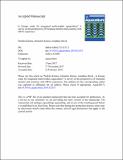Files in this item
Is Europe ready for integrated multi-trophic aquaculture? A survey on the perspectives of European farmers and scientists with IMTA experience
Item metadata
| dc.contributor.author | Kleitou, Periklis | |
| dc.contributor.author | Kletou, Demetris | |
| dc.contributor.author | David, Jonathan | |
| dc.date.accessioned | 2019-02-24T00:33:52Z | |
| dc.date.available | 2019-02-24T00:33:52Z | |
| dc.date.issued | 2018-03-01 | |
| dc.identifier | 252394126 | |
| dc.identifier | e3a26bc2-4d2b-4640-910b-6e19caa49206 | |
| dc.identifier | 85042464991 | |
| dc.identifier | 000429323600016 | |
| dc.identifier.citation | Kleitou , P , Kletou , D & David , J 2018 , ' Is Europe ready for integrated multi-trophic aquaculture? A survey on the perspectives of European farmers and scientists with IMTA experience ' , Aquaculture , vol. 490 , pp. 136-148 . https://doi.org/10.1016/j.aquaculture.2018.02.035 | en |
| dc.identifier.issn | 0044-8486 | |
| dc.identifier.other | RIS: urn:9892477FBEC8CAFDBA5CB7E7941689D5 | |
| dc.identifier.uri | https://hdl.handle.net/10023/17148 | |
| dc.description.abstract | Integrated Multi-Trophic Aquaculture (IMTA) refers to the integrated farming of several species from different trophic levels in close proximity. In IMTA, one species is intended to complement another. The concept has long been in use in Asia and contributes significantly to the sustainability of aquaculture as it can potentially drive ecological efficiency, environmentally acceptability, product-diversity, profitability and benefit society. Although the concept has received increasing academic attention during the last two decades, it has not yet become a commercial reality in European mariculture. The reasons for this were explored, by interviewing farmers and scientists with previous experience on IMTA. The interviewing approach can be effective in identifying important omissions from the available literature and also possible exaggerations of positive results. For the purposes of this study, a qualitative survey was undertaken using a structured questionnaire with open-ended questions. As a result, the opinions of 34 farmers and scientists with substantial experience of IMTA from 12 European countries have been obtained. A broad spectrum of IMTA impediments has been identified. These have been separated into nine major categories; namely Biological, Conflicts, Environmental, Interest, Legislation, Market, Operational, R&D, and Vandalism. The importance of each category was found to vary among different locations and regions of Europe indicating the need for site-specific targeted approaches. Nevertheless, factors from several categories were raised in all countries/IMTA configurations which highlights that for IMTA to be further developed and adopted, the involvement of stakeholders and personnel from several disciplines is necessary (i.e. biologists, economists, engineers, farm managers, modellers, regulators, stakeholders and statisticians). This work identifies many of the challenges that European IMTA is likely to encounter, and proposes areas that are likely to benefit from focused research and development. | |
| dc.format.extent | 1373029 | |
| dc.language.iso | eng | |
| dc.relation.ispartof | Aquaculture | en |
| dc.subject | Aquaculture | en |
| dc.subject | IMTA survey | en |
| dc.subject | Farmers and scientists | en |
| dc.subject | Integrated multi-trophic aquaculture | en |
| dc.subject | Barriers | en |
| dc.subject | Challenges | en |
| dc.subject | QH301 Biology | en |
| dc.subject | SH Aquaculture. Fisheries. Angling | en |
| dc.subject | NDAS | en |
| dc.subject.lcc | QH301 | en |
| dc.subject.lcc | SH | en |
| dc.title | Is Europe ready for integrated multi-trophic aquaculture? A survey on the perspectives of European farmers and scientists with IMTA experience | en |
| dc.type | Journal article | en |
| dc.contributor.institution | University of St Andrews. School of Biology | en |
| dc.identifier.doi | https://doi.org/10.1016/j.aquaculture.2018.02.035 | |
| dc.description.status | Peer reviewed | en |
| dc.date.embargoedUntil | 2019-02-24 |
This item appears in the following Collection(s)
Items in the St Andrews Research Repository are protected by copyright, with all rights reserved, unless otherwise indicated.

